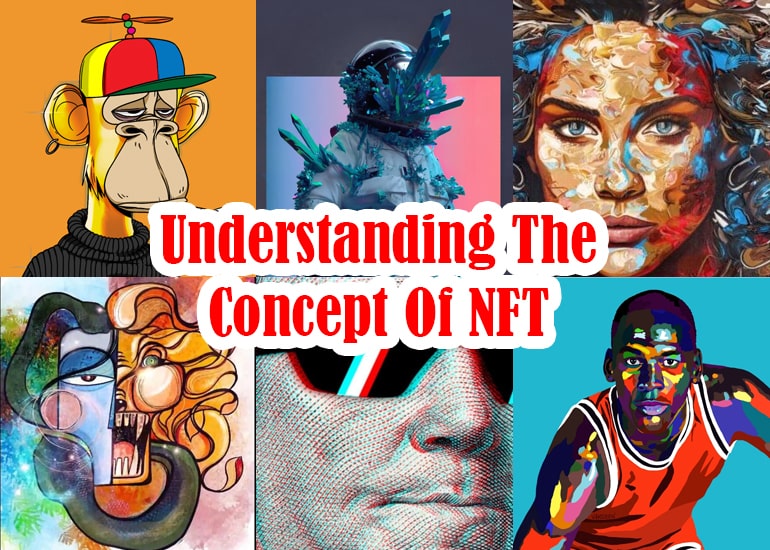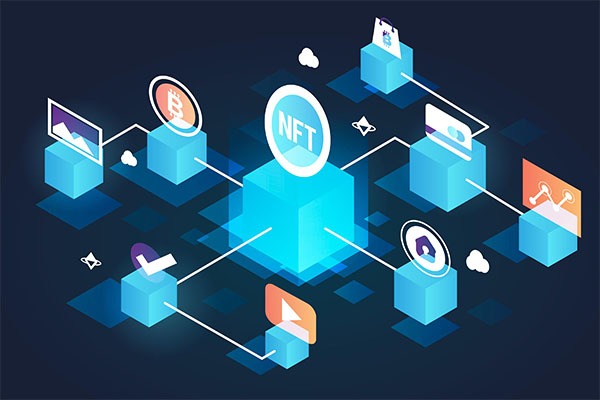
The acronym NFT refers to "non-fungible token" that is pretty commonly heard these days. A fungible item, such as a dollar bill, is equal to and maybe traded for any dollar note. But a non-fungible token on the other hand is a one-of-a-kind decentralized cryptocurrency that cannot be sold for any another NFT in exchange. As a result, each NFT is a unique piece when it comes to its worth. NFTs are exchanged from one proprietor to the next via distributed ledger technology, generating digital traces that confirm the deal from sender to receiver. This specifies the lender's one-of-a-kind rights of the owner who is the new owner.
Several NFTs are at top standard components of the Ethereum Blockchain network. Ethereum is a cryptocurrency like Litecoin and Dogecoin, but its blockchain also enables such NFTs, which hold additional data that allows them to function uniquely, for instance, an Ethereum token. It's worthy of note that various blockchain networks can use NFT processes in their very own ways.
Why Is It That Non-Fungible Tokens Are Getting So Widely Known?
NFTs have been here since 2015, but due to several variables, they are seeing a revival. The first and arguably most evident is the normalcy and enthusiasm around cryptocurrency and the use of blockchain technologies that underpin them. Further than the technologies, there's the mix of devotion, royalty finance, and commodity laws. Customers want a piece of the action when owning unique device property and even holding it as an investment.
Whenever anyone purchases a non-fungible token, they become the material holder, but it may still be transmitted over the internet. An NFT may reach a wider audience since it is shown digitally, the more worth it creates. When the item sells, the previous investor receives a 10% portion, with a tiny part going to the portal and the rest to the new owner. As a result, as powerful digital marketing resources are purchased over a period, there is the possibility for recurring revenue.
When it comes to NFTs, credibility is the key. Due to the blockchain, digital assets have unique information that distinguishes them from other NFTs and makes them effortlessly traceable. Forged collectibles cannot be created or circulated since each object can be connected to the initial maker or publisher. Unlike Bitcoins, they can't be properly traded with one another, as no two NFTS are identical.

What Are The Characteristics Of NFT?
NFT, on a serious note, is unique with its non-fungible characteristic that it can't be exchanged with other NFT of the same worth. This character of uniqueness makes NFT an out-of-the-league cryptocurrency, which, in contrast, can be useful for identifying digital and intellectual assets in the virtual world such as videos, games, graphics, etc. NFT schemes, being decentralized applications, enjoy the fringe bene?ts and characteristics from their fundamental public ledgers. However, the underlying qualities and characters give a clear and concise image of how the new-age cryptocurrency is significant for virtual trading.
- Veri?ability- NFT holds unique token metadata, thus taking ownership of a virtual asset publicly veri?able.
- Transparent Implementation- All activities being held around Crypto trading, e.g., buying, selling, and minting, are publicly accessible
- Availability- Always available for access with never-failing system server
- Tamper-resistance- Tampering is the talk of the past. With NFTs, manipulation of metadata and records is impossible with secure storage.
- Tradability- All NFTs and NFT-integrated products can be traded and exchanged arbitrarily.
- Usability- NFTs contain updated metadata and ownership details, making them user-friendly for trading in the virtual world.
What Are The Uses And Opportunities For NFT?
Possibilities of uses and opportunities are endless with NFT. This new-generation cryptocurrency holds immense potential in the virtual market for safe and secure trading. Here are the three top industries that expect to be seeking the greatest influence with the use and integration of NFTs:
1. Gaming Industry
NFT can provide gamers with ownership records of the items in the games, enabling buying and selling items in the games among sellers. Furthermore, the top-notch game developers working in an NFT-integrated ecosystem can earn royalties every time a sale or purchase happens. With secure financial marking on the gaming items, it is possible to transact them in the virtual world thus, an all-inclusively beneficial model for gamers and game developers.
2. Blockchain Applications
NFTs, with their characteristic of uniqueness, hold a high scope of use and integration in the development of blockchain applications. Furthermore, maintaining the security and privacy of data in the virtual world gave rise to the development, blockchain applications and NFTs, with the features exclusivity, making it worth integrating into the trading of blockchain applications.
3. Virtual Events
Non-Fungible Token (NFT) can be of great use in organizing virtual events with a safe and secure ticketing system. NFTs can entirely change how virtual/hybrid events happen in the traditional ecosystem. They can act as a tool to develop and execute pre-event marketing strategies, helping planners create buzz around. NFT-integrated unique ownership feature can make the ticketing system entirely virtual with title marking of the buyers.
All In All
In virtual dealing and art acquisition, NFTs are becoming increasingly popular. Ensure to choose the right coin to purchase the NFT you desire. Once you have the NFT, you may keep it and utilize it in different downloads or sell it to another dealer looking for a one-of-a-kind asset.
Looking for a trustworthy IT Services and Solutions provider? Connect with us today and get Cost-Effective Quotations! Give us a quick call at +91-7827171844!
































































